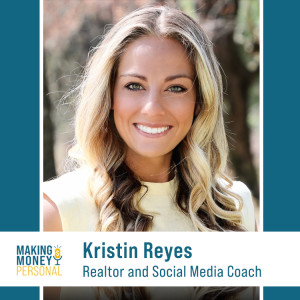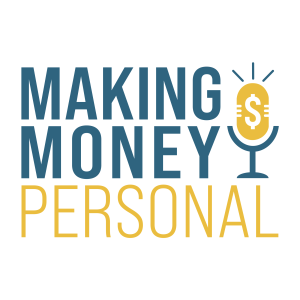Episodes

Thursday May 26, 2022
Episode 45: Using Social Media to Promote Your Business with Kristin Reyes
Thursday May 26, 2022
Thursday May 26, 2022
Life is busy. This could be the understatement for so many of us. How do we juggle family career civic responsibility and social media? In this episode, we'll hear from realtor and social media coach Kristen Reyes as she provides tips on how to handle the busyness of life, and how to use social media to grow your business.
Kristin and Kendall's website: https://www.reyeshometeam.net/
Call Kristin at (603) 489-7172
Email Kristin at kristinreyes2@gmail.com
Follow Kristin and Kendall on Instagram and Facebook
View episode transcript.
Like what you heard? Go ahead and share on your social media! Visit trianglecu.org to learn more about how we can serve you and don't forget to follow us on Facebook and Twitter!

Tuesday May 24, 2022
Finding Your First Job After Graduation - Money Tip Tuesday
Tuesday May 24, 2022
Tuesday May 24, 2022
You’ve just graduated from college, so now what are you going to do? Here are some tips on how to land a job after college.
Like what you heard? Go ahead and share on your social media! Visit trianglecu.org to learn more about how we can serve you and don't forget to follow us on Facebook and Twitter!
Transcript:
Welcome to Money Tip Tuesday from the Making Money Personal Podcast.
First make sure you have all of the proper documents before applying. Having a solid resume is a good first step. Typically, your resume after college should not exceed one page. On the resume you should include relevant job experiences, where you graduated from, and skills you have. You should also have a way for potential employers to contact you, so include your phone number, email address, and LinkedIn. If you have an online portfolio, you can also include a link to that.
Most job applications will want a cover letter. This is typically a one-page letter that allows you to tell potential employers more about yourself, your experience, your interests, and why they should hire you for the job. Since you will be applying to a lot of jobs, it’s a smart idea to create a template cover letter where you can fill in the blanks to personalize the letter for the job you are applying for.
Now that you have all of your documents ready, it's time to start applying! There are a bunch of online job search boards that you can choose from, with Indeed and LinkedIn being the most popular. If you have ideas of what you want to do, just type it into the job search and see what results come up. It's also a good idea to narrow down the search results and only look at the entry-level positions. Apply to as many jobs as you can, that way you have a better chance of hearing back from at least one company.
An unconventional way you can find places to apply is Google maps. Search for whatever industry you want to work in and add “Near Me”. Then look at the businesses nearby, go to their website, and see if they have any open positions. If there’s a specific company that you want to work for, you can also check to see if they have any openings. If there aren’t any, there may be an email or phone number you can contact to talk to someone about working there.
After applying, all you can really do is wait for the hiring teams to get back to you. Some places respond very quickly, while others can take weeks and months. It is quite common to not hear back at all, which can be frustrating.
When you do get invited to an interview, make sure you come prepared. Do a bit of research on the company and explore their website, since you don’t want to go in blind. Have talking points ready that showcase your skill set and why you would be a valuable addition to their team. After the interview, send a follow-up email saying that it was nice meeting with them and that you look forward to hearing from them soon. With any luck, you’ll be invited to another interview and maybe even land a job offer!
Getting a job takes a lot of time and effort, but if you’re constantly applying and making connections, you may be working sooner than you think!
If you found this episode helpful, we’d like to hear from you about thoughts on this show or maybe you have some ideas on other topics we should cover, email us at tcupodcast@trianglecu.org. Be sure to subscribe to the Making Money Personal podcast for our full episodes and weekly Money Tips wherever you listen to podcasts and follow us on Facebook for more great content.
On behalf of the podcast team, thank you to our sponsor, Triangle Credit Union, and thank you, as always, for listening.
Have a great day everyone!

Tuesday May 17, 2022
Tips to Manage a Rent Increase - Money Tip Tuesday
Tuesday May 17, 2022
Tuesday May 17, 2022
Rent increase is on the rise and has increased almost 50% since 2008. Now more than ever it's important to know how to handle it.
Additional resources:
https://www.cnbc.com/2021/11/28/how-to-prepare-for-a-big-rent-increase-.html
https://nhlegalaid.org/self-help-guides/housing/leases-security-deposits/rent-increases
Like what you heard? Go ahead and share on your social media! Visit trianglecu.org to learn more about how we can serve you and don't forget to follow us on Facebook and Twitter!
Transcript:
Welcome to Money Tip Tuesday from the Making Money Personal Podcast.
Depending on where you live, there is no legal limit to how much your property owner can raise your rent. There is currently no limit in New Hampshire or Massachusetts. In order for the rent increase to be valid, the property owner must give 30 days’ notice and then the tenant needs to agree and sign. To protect yourself against rent increases, have a written lease that fixes the rent for a period of time. If you are paying rent month to month, the property owner can increase the rent each time you pay.
Renters should proceed with caution when they lease with an escalator clause. These clauses allow the property owner to increase the rent before the lease runs out, so it's best to avoid leases with an escalator clause. This only applies for specific reasons, such as an increase in taxes and utilities. If you do end up signing a lease with an escalator clause and the property owner increases the rent, make sure you are only being charged for increased taxes and/or utilities.
Talk with your property owner to see why the rent is increasing. You may be able to negotiate back down to the original rent or at least lower than the new cost. Before negotiating, do a bit of research. Are there a lot of vacancies in the building? You can use this as leverage by saying you can offer to tell people about the vacancy and try to get new people to move in. Look at the average cost of rent in your area – are you paying higher than average for comparable space? If it is, use this to your advantage. Tell your property owner that they are overpriced and moving may be a cheaper option for you. This, paired with vacancies in the building, may make the property owner reconsider, as they can’t lose out on more revenue. CNBC says to keep this in mind is “If your property manager or owner senses your desperation, you won’t have a solid stance to negotiate.”
If the landlord won’t back down on the increase, try seeing if you can get some additional perks. Ask for some upgraded appliances or see if you can get some utilities included with the rent.
If the landlord still won’t back down and refuses to negotiate, it might be time to consider moving. Moving can be expensive, so make sure you consider all of your other options first.
If you found this episode helpful, we’d like to hear from you about thoughts on this show or maybe you have some ideas on other topics we should cover, email us at tcupodcast@trianglecu.org. Be sure to subscribe to the Making Money Personal podcast for our full episodes and weekly Money Tips wherever you listen to podcasts and follow us on Facebook for more great content.
On behalf of the podcast team, thank you to our sponsor, Triangle Credit Union, and thank you, as always, for listening.
Have a great day everyone!

Tuesday May 10, 2022
Reasons to Borrow Local When you Buy Local - Money Tip Tuesday
Tuesday May 10, 2022
Tuesday May 10, 2022
You’ve found your dream home and you’re ready to buy! How exciting and frightening! Purchasing your home is one of the biggest financial decisions a new homeowner can make. In this tip, we share some reasons why it’s important to use a local financial institution for your big step.
Learn more about Triangle's local mortgage lending: https://trianglecu.mymortgage-online.com/
Check out the other podcast episodes in our home buying series:
How Do I Get Pre-Approved For My New Home?
Finance Options for My New Home Purchase
Like what you heard? Go ahead and share on your social media! Visit trianglecu.org to learn more about how we can serve you and don't forget to follow us on Facebook and Twitter!
Transcript:
Welcome to Money Tip Tuesday from the Making Money Personal podcast.
Buying a new home is a big step so it’s fairly important you’re making this journey with a reputable, credible financial institution. Here are some reasons why you should consider financing your mortgage with your local credit union:
Personal Service – You can meet your Mortgage Originator in person to apply or ask questions. You are not just a number. Mortgage Originators guide you through your first mortgage purchase or refinance and are very responsive and focused on the member experience.
Local Expertise – Our local experts work with other local experts, such as realtors and appraisers. It’s their business to know the market and use their years of experience to benefit you.
Mortgage Servicing – Your loan is serviced locally so if you have concerns with your mortgage you can stop by any of our branches for assistance or make your payments. Every loan, whether small or large, receives the same attention and service.
I can speak from personal experience on local servicing. Years ago, I had a mortgage with a national lender. Before I made my first mortgage payment, I received a notice that my loan was sold to another lender, which meant new customer service numbers, new loan numbers—it was a nightmare! Whenever I had a question, I had to weed through paperwork to find numbers and when I finally found what I was looking for, I would dial the customer service number and wait—it was very frustrating. About six months into this fiasco, I refinanced my mortgage with Triangle, and worked with my local mortgage originator who walked me through the refinance step-by-step. If I had any questions, it was a simple email with a fast response. Now I have a local lender with a lower rate, which was a savings for me!
The Triangle Mortgage Team strives to meet the top four expectations from ALL borrowers, according to an article published by Pipeline Magazine, which are:
Speed – Borrowers want the process to be fast and don’t really care about the process itself.
Clarity & Communication – Borrowers want to be informed from start to finish; they don’t want to have to call and believe it’s the financial institutions job to inform them throughout the mortgage process.
Personalization – Borrowers want the human touch. Eighty-five percent of today’s borrowers want and expect the human touch throughout the mortgage process. Buying a home is a big deal. Financing a home is frightening. Borrowers want reassurance they are doing the right thing and doing it the right way.
Convenience – Borrowers believe lenders should be able to obtain every possible piece of information about them and the house they are purchasing without having to invest too much time themselves.
Safety – It’s important for borrowers to know their lender is concerned about their privacy and personal information as much as they are.
We recently asked one of our local mortgage originators for some insight on why it’s important to borrow local and here’s what she said:
“Going into a local branch and having the option of working with someone face to face, gives a lot of members peace of mind. All too often, we get members that refinance here because they are “sick of dealing with” the larger companies. They don’t know where they are calling and sometimes can’t get anyone on the phone or to give them the answers they need after the loan closes. Usually, local lenders have lower closing costs because we are local and service our own loans. We do not sell our servicing, and this is a HUGE selling point for our members. They want to know that if they have questions on their loan, they can reach someone at the same place they original took the loan out at, and there are lower PMI costs for credit unions. Our pricing is a lot less than the larger companies out there because we get a discount for being a credit union.”
If you’re a new homebuyer or thinking about homeownership, visit trianglecu.org, select Mortgages at the top of the website. Triangle’s dedicated Mortgage web portal gives you the information you need, whether you’re ready to apply for pre-approval, search our lending programs and rates, or connect with our team. If you’re ready to step into homeownership, our Mortgage team is here to help you with your journey.
If you found this episode helpful, be sure to listen to our other episodes in this Homebuyer Series: How Do I Get Pre-Approved for My New Home, and Finance Options for My New Home Purchase. As always, we’d like to hear from you about thoughts on this show or maybe you have some ideas on other topics we should cover, email us at tcupodcast@trianglecu.org. Be sure to subscribe to the Making Money Personal podcast for our full episodes and weekly Money Tips wherever you listen to podcasts and follow us on Facebook for more great content.
On behalf of the podcast team, thank you to our sponsor, Triangle Credit Union, and thank you, as always, for listening.
Have a great day everyone!

Tuesday May 03, 2022
Tips for Buying from Online Marketplaces - Money Tip Tuesday
Tuesday May 03, 2022
Tuesday May 03, 2022
Online shopping is a quick and easy way to buy what you want from the comfort of your own home. However, you need to be careful to make sure you don’t get scammed. In this tip, we share some tips on how to safely buy from online marketplaces.
Like what you heard? Go ahead and share on your social media! Visit trianglecu.org to learn more about how we can serve you and don't forget to follow us on Facebook and Twitter!
Transcript:
Welcome to Money Tip Tuesday from the Making Money Personal podcast.
If you’re planning to buy something from an online seller, an important first step is to make sure the website or the seller is trustworthy. For the website, make sure the URL starts with https. The https signifies the website is secure and has a layer of security that encrypts your information. Most browsers have a lock icon next to the URL to show that the website is secure.
Check for poor grammar and spelling mistakes. Online marketplaces that have poor grammar, spelling errors, and weird formatting were most likely put together quickly without much thought and may not be legitimate.
Most online marketplaces, such as eBay and Facebook, have seller ratings. Look at the seller reviews before buying to see what other people have said about them. You might learn that other customers have had a bad experience with the seller or were even scammed. You can also check the product reviews too, to see if it is worth buying. If possible, check the quality of the item before making the purchase. Request the seller send you additional pictures or if you can meet in person to look at the item yourself.
Check to see if the online marketplace has some kind of consumer protection or if the seller has a return policy. If there isn’t consumer protection, the website might not be a safe place to buy from. You should also check other websites to see if they offer consumer protection. While there, look to see how much the other websites are selling the item for. If it is below market value, it might be too good to be true and most likely a scam.
In addition to these cautionary steps, it is important to protect your personal information. Don’t give out your personal information to a seller that seems untrustworthy. Use your credit card instead of your debit card. When meeting in real life, use cash or a person-to-person payment app. When buying online, always make sure it is on a secure internet connection.
If you think you have been scammed, contact the seller and/or the marketplace. If you are not satisfied with the outcome and you have been scammed, report it to the Federal Trade Commission.
We hope you found this Money Tip helpful. If there are any other tips or topics you’d like us to cover, let us know at tcupodcast@trianglecu.org and don't forget to like and follow our Making Money Personal FB page and look for our sponsor, Triangle Credit Union on Instagram and LinkedIn to share your thoughts.
Thanks for listening to today’s Money Tip Tuesday and be sure to check out our other tips and episodes on the Making Money Personal podcast.

Thursday Apr 28, 2022
Thursday Apr 28, 2022
If you've ever considered the opportunity of buying and owning rental properties, today's guest will inspire you. In this episode, we're joined by Angelica Resto, manager of our South Nashua branch and longtime employee of Triangle Credit Union.
Angelica joins us to discuss her experience as a real estate owner and how she manages the responsibilities of running a successful rental property business.
Learn more about Triangle's Commercial Services for business planning and funding
Learn more about Triangle's Mortgage program or chat with a Mortgage Originator to discuss property funding options
View episode transcript.
Like what you heard? Go ahead and share on your social media! Visit trianglecu.org to learn more about how we can serve you and don't forget to follow us on Facebook and Twitter!

Tuesday Apr 26, 2022
Simple Health Habits to Save You Money - Money Tip Tuesday
Tuesday Apr 26, 2022
Tuesday Apr 26, 2022
Healthy eating habits are good for you physically, as well as good for you financially. In this tip, we share how simple eating habits will save you money over time.
Like what you heard? Go ahead and share on your social media! Visit trianglecu.org to learn more about how we can serve you and don't forget to follow us on Facebook and Twitter!
Transcript:
Welcome to Money Tip Tuesday from the Making Money Personal.
Have you noticed the cost of groceries is through the roof? On today’s episode, we want to share how some simple eating habits will save you money. If you love to plan, you’re going to love the first step, which is to: plan out what you are going to eat for the week. Look at what is on sale at your local grocery store and plan what you are going to buy based on these sales. Buying on sale will definitely save you a few dollars. You can check the grocery store’s sales by looking at their weekly flyer or their website.
Second, if you want to eat healthily, make sure you add fruits and vegetables to your cart. To save some money here, do some research as to which produce is in season. Produce is at its least expensive when it is in season. If you want your produce to be very fresh, you may want to consider making your own garden to grow whatever fruits and vegetables you want. Even if you don’t have a yard, you can buy an indoor greenhouse to grow your garden.
Third, make sure that you eat whatever food you do buy, especially perishable items. Check the expiration date so you don’t buy food or drink that is about to go bad. Foods such as produce and meats can often be costly and not eating them before they expire can quickly become expensive and wasteful.
Fourth, buy ingredients instead of premade food. Although it is more convenient to buy food that just needs to be cooked with no preparation, it tends to be more expensive. Buying ingredients allows you to make multiple meals while paying less overall. However, it ultimately comes down to whether you have time to do meal preparation. This same principle goes for packing a lunch instead of buying one. It is more convenient to buy lunch at a fast-food restaurant, but it is cheaper (and in most cases healthier) to pack a lunch when you know you’re going to be out for a while, which brings us to our firth point, try to avoid eating and drinking out. It is much cheaper to make your own dinner. Coffee can be made at home for much less and your favorite coffee brands most likely sell coffee that you can brew at home. Alcohol is also much cheaper to buy at a store than buying a drink at a bar.
Another benefit of making your own food is that you have portion control. You can make extra food, so you have leftovers that you can eat on another day. Instead of having to pack lunch, you can just grab whatever you had for dinner.
Making healthier food choices in general will save you money. A lot of high calorie foods that are not necessarily healthy for you, such as potato chips and soda, can add up quickly. It is important to look at both the nutritional value and the price of the item.
Another way that you can save money is brushing your teeth after you eat. Taking care of your teeth on a regular basis helps you avoid cavities and a costly dentist's appointment. This simple activity only takes a few minutes out of your day and can save you from tooth decay and medical bills.
If you found this episode helpful, we’d like to hear from you about thoughts on this show or maybe you have some ideas on other topics we should cover, email us at tcupodcast@trianglecu.org. Be sure to subscribe to the Making Money Personal podcast for our full episodes and weekly Money Tips wherever you listen to podcasts and follow us on Facebook for more great content.
On behalf of the podcast team, thank you to our sponsor, Triangle Credit Union, and thank you, as always, for listening.
Have a great day everyone!

Tuesday Apr 19, 2022
Finance Options for Your New Home Purchase - Money Tip Tuesday
Tuesday Apr 19, 2022
Tuesday Apr 19, 2022
You’re pre-approved for your new home purchase and just found your dream home, now what do you do? In this tip, we talk about your next step on how to find the best mortgage for your new home purchase.
Learn more about the different mortgage options at https://trianglecu.mymortgage-online.com/
Contact one of our Triangle Mortgage Originators: https://trianglecu.mymortgage-online.com/OurOriginators.html
View current mortgage rates: https://trianglecu.mymortgage-online.com/MortageRates.html
Like what you heard? Go ahead and share on your social media! Visit trianglecu.org to learn more about how we can serve you and don't forget to follow us on Facebook and Twitter!
NMLS# 528721 - Equal Housing Opportunity - Federally insured by NCUA - Certain restrictions may apply. See website for details.
Transcript:
I’m Ryan from Triangle Credit Union’s Mortgage Advantage Team and you’re listening to Money Tip Tuesday from the Making Money Personal podcast.
If you’re already pre-approved or pre-qualified for your new home purchase, you’re most likely working with a mortgage representative from your local credit union. That’s perfect! Finding and connecting with a mortgage originator is a smart move. Like local realtors who know their markets, mortgage originators are experts in their home lending programs and can help guide you into the best lending product for you.
If you’re looking at purchasing your first home, you may qualify for our First Time Homebuyer program which means you can purchase with as little as 3% down.
Too often new homeowners just look at rates when determining which bank, credit union or mortgage company to use, but there ARE many finance options for your new home purchase and the one you select should be the one that fits best with your budget, your financial goals, and your future. Conversations about where you want to be in 5, 10, or 30 years helps the lending team identify a mortgage that is most aligned with you and where you see yourself today, tomorrow and in the years to come.
For example, if you’re a new homeowner, you may be purchasing a starter home. Traditionally, this is a smaller home located on a smaller lot size. You’re probably in your thirties and your experiencing success in your career, but you know you’ll be in a much better position financially in another 5-7 years. If this is a scenario that resonates with you, then you may want to consider an Adjustable Rate Mortgage, which is also referred to as an ARM (capital A R M). An ARM offers historically lower rates and lenders usually offer options to choose from. As a Mortgage Originator from Triangle Credit Union, I can explain about one of our favorite products, which is the 5/5 ARM. In a nutshell, when you see a rate like this, there is a number, then a slash or diagonal line, and then another number. The first number represents how long the mortgage is fixed for—in this case, the 5/5 ARM has a fixed rate for the first five years; after that period, the mortgage rate becomes variable and adjusts every five years, which is what the second five represents. There are factors to consider when looking at an ARM as a mortgage option, but a good lender will explain everything to you. You should never walk away confused about your mortgage rate and terms.
Most lenders offer adjustable rate and fixed rate mortgages. Fixed rate mortgages are commonly referred to as CONVENTIONAL fixed. Again, most lenders have CONVENTIONAL fixed options. These options are tied to the term of the loan with common fixed rate terms at 10-, 15- and 30-year loans.
The term of your loan can be extremely important in high real estate markets where home prices are over the national norm. For example, Triangle Credit Union serves the southern NH housing market and home prices are considered high in our service area. One of our ARM products offers a 40-year term, which means the loan dollars are amortized or extended over 40 years, rather than the traditional 30 years; this extended period of 10 years reduces the monthly mortgage payment and makes purchasing a new home affordable for many homebuyers.
Lending rates can fluctuate daily, sometimes hourly so it’s good to work with a local lending expert to lock in a rate. A lock-in or rate lock on a mortgage loan means that your interest rate won't change between the time you make an offer on a house and the time you close on your new home loan—providing you close within the specified time frame and there are no changes to your application.
Whether an Adjustable Rate or CONVENTIONAL Fixed Mortgage is best for you and your situation is a decision you can work through with your local lender.
Visit trianglecu.org, select Mortgages at the top of the website. Triangle’s dedicated Mortgage web portal gives you the information you need, whether you’re ready to apply for pre-approval, search our lending programs and rates, or connect with our team. If you’re ready to step into homeownership, our Mortgage team is here to help you with your journey.
If you found this episode helpful, be sure to listen to our other episodes in this Homebuyer Series: How Do I Get Pre-Approved for My New Home, and the Benefits of Buying Local and Borrowing Local. As always, we’d like to hear from you about thoughts on this show or maybe you have some ideas on other topics we should cover, email us at tcupodcast@trianglecu.org. Be sure to subscribe to the Making Money Personal podcast for our full episodes and weekly Money Tips wherever you listen to podcasts and follow us on Facebook for more great content.
On behalf of the podcast team, thank you to our sponsor, Triangle Credit Union, and thank you, as always, for listening.
Have a great day everyone!

Tuesday Apr 12, 2022
What Every Student Should Know About Student Loans - Money Tip Tuesday
Tuesday Apr 12, 2022
Tuesday Apr 12, 2022
Are you thinking about going to college and not exactly sure how you are going to pay? In this tip we talk about student loans and the many options you have available to finance your college costs.
Check out this Nerdwallet Article for more information about student loans
Check out studentaid.gov for more information about college funding options
Listen to our other Money Tip Tuesday about Using a Home Equity Line of Credit to Cover College Costs
Like what you heard? Go ahead and share on your social media! Visit trianglecu.org to learn more about how we can serve you and don't forget to follow us on Facebook and Twitter!
Transcript:
Welcome to Money Tip Tuesday from the Making Money Personal.
Student loans are loans designed to assist students in paying for college or university. This means that student loans can only be used for academic related expenses, such as tuition, textbooks, and housing.
The first thing you need to know about student loans is that there are two different kinds: federal and private. Federal loans are preferable over private loans for students for a variety of reasons. For instance, federal loans have income-based repayment plans, forgiveness, and don’t require credit history. This may not always be the case with private loans. It’s also important to consider what type of federal loans are being offered. Subsidized loans don’t acquire interest while in school, while unsubsidized loans do. Federal loans usually offer lower interest rates than private loans.
However, there is a cap on the amount of money you can borrow in a year, which depends on what year of school you are in and whether you are a dependent or an independent student. For purposes of student loans, a dependent student means you are under 24 years old, not married, don’t have any dependents yourself, not currently serving in active duty or a veteran and you have a parent or guardian. If you have dependent student status, you have to report your information and your parents' information on the FAFSA. Independent students only have to report their own information and their spouse’s info, if married.
With the exception of subsidized federal loans, you will be acquiring interest on the money you borrow while you’re in school. This interest is added to the amount of money you have to pay back for the federal or private loans. Also, unless you get a fixed rate, the percentage of interest could go up or down on your loan.
Another thing to keep in mind about student loans is that you should only borrow what you need and what you can eventually repay. The amount you borrow should keep your payments at 10% percent of your projected monthly income, after taxes.
Once you leave college, there is a six-month grace period before you need to pay your first bill. You can also refinance your student loans, which will save you money by replacing the previous loan with a newer low-cost loan through a private lender. This may reduce your monthly payment. To qualify to refinance your student loans, you will need a credit score at least in the 600 range (or higher) and a steady income. If you don’t have either of these, you may need someone who does qualify to co-sign with you.
You can learn more about federal loans at studentaid.gov. Nerdwallet.com has plenty of resources to see which private loan is best for you.
If there are any other tips or topics you’d like us to cover, let us know at tcupodcast@trianglecu.org and don't forget to like and follow our Making Money Personal FB page and look for our sponsor, Triangle Credit Union on Instagram and LinkedIn to share your thoughts.
Thanks for listening to today’s Money Tip Tuesday and be sure to check out our other tips and episodes on the Making Money Personal podcast.
Have a great day!

Tuesday Apr 05, 2022
How Do I Get Pre-Approved for My New Home? - Money Tip Tuesday
Tuesday Apr 05, 2022
Tuesday Apr 05, 2022
The thought of buying your first home is exciting and overwhelming. Where do you start? In this tip we start at the beginning of the home buying process and walk you through how to get pre-approved for your new home purchase.
View current mortgage rates
Start your pre-approval with Triangle
Contact a Mortgage Originator
Watch our First Time Homebuyer Webinar on YouTube
Like what you heard? Go ahead and share on your social media! Visit trianglecu.org to learn more about how we can serve you and don't forget to follow us on Facebook and Twitter!
Transcript:
Welcome to Money Tip Tuesday from the Making Money Personal podcast.
With real estate apps today, it’s easy for prospective homebuyers to search for new homes, but that’s not really where you want to start the homebuying process. The first step is to find how much home you can afford and the best way to do that is to work with a mortgage originator at your local credit union to pre-qualify you for your home purchase.
In this critical step, you will apply for a new home purchase and based on your income, debt, and current credit score, you will receive an estimated amount that you are qualified for to borrow for a mortgage.
The process is quite easy—you simply apply online. You will be guided through the application process with a series of questions. You will need this information on hand to answer some questions, so it’s best to have it before you start the application. Here are the items you’ll need:
Current paystub reflecting year-to-date earnings
Two month’s bank statements (all pages) from other banks you bank with
W-2 Form from the most recent year & prior year
Verification of other income sources (mutual funds, Social Security, pension, alimony, child support)
Most recent statement of Retirement, 401K, IRA’s accounts
If Self employed - 2 years tax returns and a year to date Profit and Loss statement
Once you enter your information, the mortgage department will assess your request and determine how much home you can afford. At this point, you will receive an email that you have been pre-approved and the amount you are pre-qualified to borrow for your new home purchase. This email can be shared with your realtor so he/she directs you into the right home for you, and one that you can afford.
As soon as your pre-qualified or pre-approved for the mortgage amount, you can begin your new home search using the amount as a guide. Please keep in mind, there are other factors to consider when estimating your home costs. For example, how much are the monthly taxes and homeowner insurance on the property and do these additional costs fit within your monthly budget?
Another unexpected expense for many new homeowners is closing costs. Closing costs are the fees and charges in excess of the purchase price of the property due at the closing of the real estate transaction. Closing costs vary and can be fairly expensive. Typically, new buyers can expect to pay between 3-6% of the purchase price in closing costs so be prepared for this additional expense and budget accordingly.
When you receive your pre-approval amount from your financial institution, that offer is good for 60 days, but you can request an extension if you feel your house hunt will extend beyond that time period. If your search goes beyond the 60 days, and you haven’t requested and received an extension, you will have to reapply.
Visit trianglecu.org, select Mortgages at the top of the website to start your pre-approval today. The whole application process should take about 30 minutes to complete, which is a short amount of time for a journey that can last a lifetime!
If you found this episode helpful, be sure to listen to our other upcoming episodes in this Homebuyer Series: Finance Options for Your New Home Purchase and the Benefits of Buying Local and Borrowing Local. As always, we’d like to hear from you about thoughts on this show or maybe you have some ideas on other topics we should cover, email us at tcupodcast@trianglecu.org. Be sure to subscribe to the Making Money Personal podcast for our full episodes and weekly Money Tips wherever you listen to podcasts and follow us on Facebook for more great content.
Thank you to our sponsor, Triangle Credit Union, and thank you, as always, for listening.
Have a great day everyone!

Financial Lessons & Tips
Join us for fun, relevant financial topics that provide you with resources to help you make financial decisions. The Making Money Personal Podcast talks about the impact that money has on your personal and professional life. Our podcast examines trends and topics with support from industry professionals.





